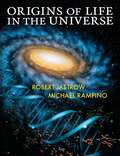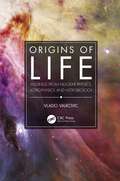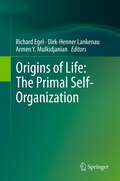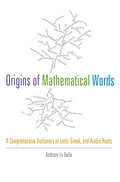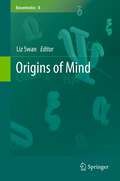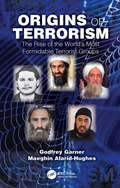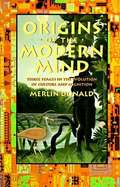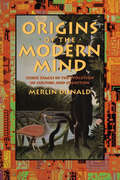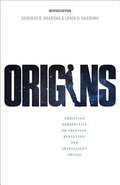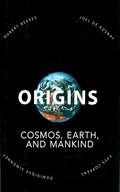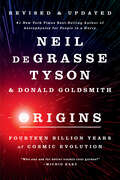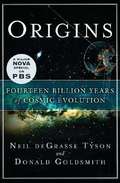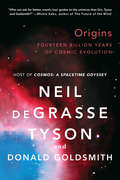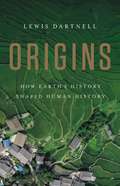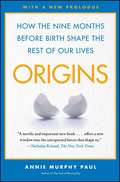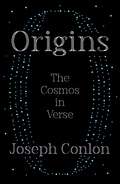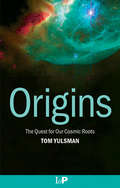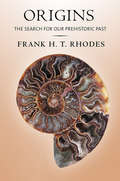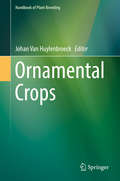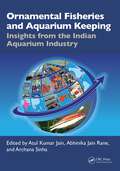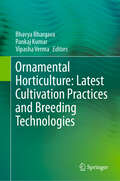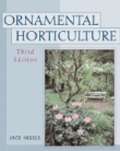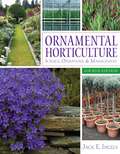- Table View
- List View
Origins of Life in the Universe
by Robert Jastrow Michael R. RampinoThis concise and highly illustrated textbook traces the evolution of the Cosmos from the Big Bang to the development of intelligent life on Earth, conveying clear science in an engaging narrative. By mapping the history of the Universe for introductory science and astrobiology courses for non-science majors, this book allows many of the most fascinating questions in science to be explored. What is the origin of the Universe? How do stars and planets form? How does life begin? How did intelligence arise? Are we alone in the Cosmos? Physics, chemistry, biology, astronomy and geology are combined to create a chronicle of events in which the swirling vapors in the primordial cloud of the Universe evolved over billions of years into conscious life. Outlining, the latest discoveries in astrobiology, this textbook is suffused with the excitement of this fast-moving field. Instructor and student support is provided at www.cambridge.org/jastrow.
Origins of Life: Musings from Nuclear Physics, Astrophysics and Astrobiology
by Vlado ValkovicThe primary purpose of this book is to prepare the ground for coordinated efforts aiming to answer the question: where and when life originated. The appearance of life involves three successive stages: i) the formation of chemical elements and their combination to simple molecules, which is the concern of physicists; ii) the evolution of organized complexity in biomolecules and their reactions, which falls within the field of chemistry; iii) the onset of Darwinian evolution after the appearance of the first cell-like structure, which is studied by biologists. This book focuses on the first two steps of this process with chapters exploring topics such as chemical element abundances; galaxies, galactic magnetic fields and cosmic rays; galactic chemical evolution. Key Features: Contains extensive lists of reference and additional reading. Includes new hypotheses concerning the origin of life. Combines consideration from nuclear physics, astrophysics, astro- and geochemistry. Despite its interdisciplinary nature, this book remains accessible to nonexperts, and would be a valuable companion for both experts and laypeople.
Origins of Life: The Primal Self-Organization
by Dirk-Henner Lankenau Richard Egel Armen Y. MulkidjanianIf theoretical physicists can seriously entertain canonical "standard models" even for the big-bang generation of the entire universe, why cannot life scientists reach a consensus on how life has emerged and settled on this planet? Scientists are hindered by conceptual gaps between bottom-up inferences (from early Earth geological conditions) and top-down extrapolations (from modern life forms to common ancestral states). This book challenges several widely held assumptions and argues for alternative approaches instead. Primal syntheses (literally or figuratively speaking) are called for in at least five major areas. (1) The first RNA-like molecules may have been selected by solar light as being exceptionally photostable. (2) Photosynthetically active minerals and reduced phosphorus compounds could have efficiently coupled the persistent natural energy flows to the primordial metabolism. (3) Stochastic, uncoded peptides may have kick-started an ever-tightening co-evolution of proteins and nucleic acids. (4) The living fossils from the primeval RNA World thrive within modern cells. (5) From the inherently complex protocellular associations preceding the consolidation of integral genomes, eukaryotic cell organization may have evolved more naturally than simple prokaryote-like life forms. - If this book can motivate dedicated researchers to further explore the alternative mechanisms presented, it will have served its purpose well.
Origins of Mathematical Words: A Comprehensive Dictionary of Latin, Greek, and Arabic Roots
by Anthony Lo BelloThe most comprehensive math root dictionary ever published.Outstanding Academic Title, ChoiceDo you ever wonder about the origins of mathematical terms such as ergodic, biholomorphic, and strophoid? Here Anthony Lo Bello explains the roots of these and better-known words like asymmetric, gradient, and average. He provides Greek, Latin, and Arabic text in its original form to enhance each explanation. This sophisticated, one-of-a-kind reference for mathematicians and word lovers is based on decades of the author's painstaking research and work.Origins of Mathematical Words supplies definitions for words such as conchoid (a shell-shaped curve derived from the Greek noun for "mussel") and zenith (Arabic for "way overhead"), as well as approximation (from the Latin proximus, meaning "nearest"). These and hundreds of other terms wait to be discovered within the pages of this mathematical and etymological treasure chest.
Origins of Mind
by Liz SwanThe big question of how and why mindedness evolved necessitates collaborative, multidisciplinary investigation. Biosemiotics provides a new conceptual space that attracts a multitude of thinkers in the biological and cognitive sciences and the humanities who recognize continuity in the biosphere from the simplest to the most complex organisms, and who are united in the project of trying to account for even language and human consciousness in this comprehensive picture of life. The young interdiscipline of biosemiotics has so far by and large focused on codes, signs and sign processes in the microworld--a fact that reflects the field's strong representation in microbiology and embryology. What philosophers of mind and cognitive scientists can contribute to the growing interdiscipline are insights into how the biosemiotic weltanschauung applies to complex organisms like humans where such signs and sign processes constitute human society and culture.
Origins of Terrorism: The Rise of the World’s Most Formidable Terrorist Groups
by Godfrey Garner Maeghin Alarid-HughesOrigins of Terrorism: The Rise of the World’s Most Formidable Terrorist Groups examines the roots of Islamic terrorism, it’s history, and some of the foundational figures in prominent terrorist organizations. Throughout, the book also addresses the use of terrorism, the "hows" and "whys" of terrorists’ goals, and their modus operandi.Historically, insurgency operations have formed the basis of a number of terrorist groups—resistance to western powers, particularly the United States, and what is viewed as their unwanted interference in regional affairs. Sections are devoted to individual terror organizations, including some of the most well-known and resilient global movements—Al Qaeda, ISIS, the Taliban, and Boko Haram, among others. Coverage details where and how they originated, who the principal organizers were, how these individuals worked—or didn’t work—together. In this, the authors look at the circumstances that allowed for these leaders, and their groups’, development and success. In this, the authors expose interesting, little-known stories and facts about the specific upbringing, family life, and personal narrative around these organizations’ founders, as well as ties to other terrorist founders and organizations. For example, the relationship between individuals such as Osama bin Laden and Musab al Zarkawi (aka Ahmad al-Khalayleh)—the founder of ‘Al Qaeda in Iraq’ (AQI), which became ISIS—is examined in detail, providing readers with some of the "stories behind the stories" to understand the prominent figures and underpinnings of major terrorist organizations’ philosophies, formation, and elements that have led to their staying power.Origins of Terrorism will be a valuable resource for security and intelligence professionals, terrorism researchers, and students, providing a unique perspective to understand terrorism and terror movements in considering counterterror efforts.
Origins of the Modern Mind: Three Stages in the Evolution of Culture and Cognition
by Merlin DonaldThis bold and brilliant book asks the ultimate question of life sciences: How did the human mind acquire its incomparable power? Origins of the Modern Mind traces the evolution of human culture and cognition from primitive apes to the era of artificial intelligence, and presents an original theory of how the human mind evolved from its presymbolic form. Illustrated with line drawings.
Origins of the Modern Mind: Three Stages in the Evolution of Culture and Cognition
by Merlin DonaldThis bold and brilliant book asks the ultimate question of the life sciences: How did the human mind acquire its incomparable power? In seeking the answer, Merlin Donald traces the evolution of human culture and cognition from primitive apes to artificial intelligence, presenting an enterprising and original theory of how the human mind evolved from its presymbolic form.
Origins: Christian Perspectives on Creation, Evolution, and Intelligent Design
by Deborah B. Haarsma Loren D. HaarsmaWhen it comes to the history of the universe, many believe that science and faith are mutually exclusive. But in this revised version of Origins, physics professors Loren and Deborah Haarsma explore what God's Word and God's world teach us about creation, evolution, and intelligent design. Clearly explaining the science, the authors focus on areas where Christians agree. They also present the strengths and weaknesses of areas where Christians differ. Origins helps you develop a deeper understanding of the origins of the universe and sort out your own views on faith and science. Small group discussion questions follow each chapter. A companion website provides resources for further study.
Origins: Cosmos, Earth, and Mankind
by Joel De Rosney Yves Coppens Hubert Reeves Dominique SimonnetIn this potent book, three eminent scientists--an astrophysicist, an organic chemist, and an anthropologist--ponder and discuss some of the basic questions that have obsessed humankind through the ages, and offer thoughtful, enlightening answers in terms the layperson can easily understand. Until now, most of these questions were addressed by religion and philosophy. But science has reached a point where it, too, can voice an opinion. Beginning with the Big Bang roughly fifteen billion years ago, the authors trace the evolution of the cosmos, from the first particles, the atoms, the molecules, the development of cells, organisms, and living creatures, up to the arrival of Homo erectus and Homo sapiens. Proactive, informative, and free of technical or scientific jargon, Origins offers compelling insights into how the universe, life on Earth, and the human species began.
Origins: Fourteen Billion Years Of Cosmic Evolution
by Donald Goldsmith Neil deGrasse Tyson“Who can ask for better cosmic tour guides?” —Michio Kaku Our true origins are not only human, or even terrestrial, but in fact cosmic. Drawing on recent scientific breakthroughs and cross-pollination among geology, biology, astrophysics, and cosmology, Origins illuminates the soul-stirring leaps in our understanding of the cosmos. This revised and updated edition features such startling discoveries as the now more than 5,000 detected exoplanets that promise to reveal exciting possibilities for life in the cosmos, and data from a new generation of ground-based and spaceborne observatories that have fundamentally changed what we know about the expanding universe?and maybe even the laws of physics themselves. From the first image of a galaxy’s birth to tantalizing evidence of water not only on Mars but also on the asteroid Ceres, as well as on moons of Jupiter and Saturn, coauthors Neil deGrasse Tyson and Donald Goldsmith conduct an exhilarating tour of the cosmos with clarity and exuberance.
Origins: Fourteen Billion Years of Cosmic Evolution
by Neil Degrasse Tyson Donald GoldsmithThis book explores new insights into the formation and evolution of our universe. It explains the breakthroughs in our knowledge of the universe from dark energy to life on Mars to the mysteries of space and time.
Origins: Fourteen Billion Years of Cosmic Evolution
by Neil Degrasse Tyson Donald Goldsmith"Who can ask for better cosmic tour guides to the universe than Drs. Tyson and Goldsmith?" --Michio Kaku, author of Hyperspace and Parallel Worlds Our true origins are not just human, or even terrestrial, but in fact cosmic. Drawing on recent scientific breakthroughs and the current cross-pollination among geology, biology, astrophysics, and cosmology, ?Origins? explains the soul-stirring leaps in our understanding of the cosmos. From the first image of a galaxy birth to Spirit Rover's exploration of Mars, to the discovery of water on one of Jupiter's moons, coauthors Neil deGrasse Tyson and Donald Goldsmith conduct a galvanizing tour of the cosmos with clarity and exuberance.
Origins: How Earth's History Shaped Human History
by Lewis DartnellA New York Times-bestselling author explains how the physical world shaped the history of our speciesWhen we talk about human history, we often focus on great leaders, population forces, and decisive wars. But how has the earth itself determined our destiny? Our planet wobbles, driving changes in climate that forced the transition from nomadism to farming. Mountainous terrain led to the development of democracy in Greece. Atmospheric circulation patterns later on shaped the progression of global exploration, colonization, and trade. Even today, voting behavior in the south-east United States ultimately follows the underlying pattern of 75 million-year-old sediments from an ancient sea. Everywhere is the deep imprint of the planetary on the human. From the cultivation of the first crops to the founding of modern states, Origins reveals the breathtaking impact of the earth beneath our feet on the shape of our human civilizations.
Origins: How the Nine Months Before Birth Shape the Rest of Our Lives
by Annie Murphy PaulWhat makes us the way we are? Some say it's the genes we inherit at conception. Others are sure it's the environment we experience in childhood. But could it be that many of our individual characteristics--our health, our intelligence, our temperaments--are influenced by the conditions we encountered before birth? That's the claim of an exciting and provocative field known as fetal origins. Over the past twenty years, scientists have been developing a radically new understanding of our very earliest experiences and how they exert lasting effects on us from infancy well into adulthood. Their research offers a bold new view of pregnancy as a crucial staging ground for our health, ability, and well-being throughout life. Author and journalist Annie Murphy Paul ventures into the laboratories of fetal researchers, interviews experts from around the world, and delves into the rich history of ideas about how we're shaped before birth. She discovers dramatic stories: how individuals gestated during the Nazi siege of Holland in World War II are still feeling its consequences decades later; how pregnant women who experienced the 9/11 attacks passed their trauma on to their offspring in the womb; how a lab accident led to the discovery of a common household chemical that can harm the developing fetus; how the study of a century-old flu pandemic reveals the high personal and societal costs of poor prenatal experience. Origins also brings to light astonishing scientific findings: how a single exposure to an environmental toxin may produce damage that is passed on to multiple generations; how conditions as varied as diabetes, heart disease, and mental illness may get their start in utero; why the womb is medicine's latest target for the promotion of lifelong health, from preventing cancer to reducing obesity. The fetus is not an inert being, but an active and dynamic creature, responding and adapting as it readies itself for life in the particular world it will enter. The pregnant woman is not merely a source of potential harm to her fetus, as she is so often reminded, but a source of influence on her future child that is far more powerful and positive than we ever knew. And pregnancy is not a nine-month wait for the big event of birth, but a momentous period unto itself, a cradle of individual strength and wellness and a crucible of public health and social equality.With the intimacy of a personal memoir and the sweep of a scientific revolution, Origins presents a stunning new vision of our beginnings that will change the way you think about yourself, your children, and human nature itself.
Origins: How the Nine Months Before Birth Shape the Rest of Our Lives
by Annie Murphy PaulWhat makes us the way we are? Some say it's the genes we inherit at conception. Others are sure it's the environment we experience in childhood. But could it be that many of our individual characteristics--our health, our intelligence, our temperaments--are influenced by the conditions we encountered before birth?That's the claim of an exciting and provocative field known as fetal origins. Over the past twenty years, scientists have been developing a radically new understanding of our very earliest experiences and how they exert lasting effects on us from infancy well into adulthood. Their research offers a bold new view of pregnancy as a crucial staging ground for our health, ability, and well-being throughout life.Author and journalist Annie Murphy Paul ventures into the laboratories of fetal researchers, interviews experts from around the world, and delves into the rich history of ideas about how we're shaped before birth. She discovers dramatic stories: how individuals gestated during the Nazi siege of Holland in World War II are still feeling its consequences decades later; how pregnant women who experienced the 9/11 attacks passed their trauma on to their offspring in the womb; how a lab accident led to the discovery of a common household chemical that can harm the developing fetus; how the study of a century-old flu pandemic reveals the high personal and societal costs of poor prenatal experience. Origins also brings to light astonishing scientific findings: how a single exposure to an environmental toxin may produce damage that is passed on to multiple generations; how conditions as varied as diabetes, heart disease, and mental illness may get their start in utero; why the womb is medicine's latest target for the promotion of lifelong health, from preventing cancer to reducing obesity. The fetus is not an inert being, but an active and dynamic creature, responding and adapting as it readies itself for life in the particular world it will enter. The pregnant woman is not merely a source of potential harm to her fetus, as she is so often reminded, but a source of influence on her future child that is far more powerful and positive than we ever knew. And pregnancy is not a nine-month wait for the big event of birth, but a momentous period unto itself, a cradle of individual strength and wellness and a crucible of public health and social equality.With the intimacy of a personal memoir and the sweep of a scientific revolution, Origins presents a stunning new vision of our beginnings that will change the way you think about yourself, your children, and human nature itself.
Origins: The Cosmos in Verse
by Joseph ConlonA poetic odyssey through the origins of the universe from one of Britain&’s leading physicists.There raged a thumping cosmic ballyhoo, A manic dance – a rumpus to arouse The universe: of Higgs and W, Electrons, gluons, muons, Zs and taus… For centuries poetry and science have been improbable, yet constant, bedfellows. Chaucer was an amateur astronomer; Milton broke bread with Galileo; and, before turning to the arts, Keats was a doctor. Meanwhile, scientific luminaries like Ada Lovelace and James Clerk Maxwell moonlighted as poets, composing verse between experiments and equations. Following in this tradition, theoretical physicist Joseph Conlon spins a dazzling intergalactic epic. Drawing on his scientific expertise, Conlon reveals the origins of our universe through two long-form poems – &‘Elements&’ and &‘Galaxies&’. Journeying from the Big Bang to the edges of our ever-expanding cosmos, Origins offers a delightful and revelatory adventure through contemporary physics.
Origins: The Lives and Worlds of Modern Cosmologists
by Alan Lightman Roberta BrawerBiographies and contributions based on interviews.
Origins: The Quest for Our Cosmic Roots
by Tom YulsmanWith stunning regularity, the search for our cosmic roots has been yielding remarkable new discoveries about the universe and our place in it. In his compelling book, Origins: The Quest for Our Cosmic Roots addresses some of the most profound issues humans have ever confronted. In his compelling book, veteran science journalist Tom Yulsman chronicles the latest discoveries and describes in clear and engaging terms what they mean. From the interior of protons to the outer reaches of the universe, and from the control room of one of the world's most powerful particle accelerators to an observatory atop the tallest mountain in the Pacific basin, Yulsman takes readers on a fantastic voyage at the cutting edge of science.
Origins: The Search for Our Prehistoric Past
by Frank H. Rhodes"Fossils are the fragments from which, piece by laborious piece, the great mosaic of the history of life has been constructed. Here and there, we can supplement these meager scraps by the use of biochemical markers or geochemical signatures that add useful information, but, even with such additional help, our reconstructions and our models of descent are often tentative. For the fossil record is, as we have seen, as biased as it is incomplete. But fragmentary, selective, and biased though it is, the fossil record, with all its imperfections, is still a treasure. Though whole chapters are missing, many pages lost, and the earliest pages so damaged as to be, as yet, virtually unreadable, this—the greatest biography of all—is one in whose closing pages we find ourselves."—from OriginsIn Origins, Frank H. T. Rhodes explores the origin and evolution of living things, the changing environments in which they have developed, and the challenges we now face on an increasingly crowded and polluted planet. Rhodes argues that the future well-being of our burgeoning population depends in no small part on our understanding of life's past, its long and slow development, and its intricate interdependencies.Rhodes’s accessible and extensively illustrated treatment of the origins narrative describes the nature of the search for prehistoric life, the significance of geologic time, the origin of life, the emergence and spread of flora and fauna, the evolution of primates, and the emergence of modern humans.
Ornamental Crops (Handbook Of Plant Breeding Ser. #11)
by Johan Van HuylenbroeckOrnamental plants are economically important worldwide. Both growers and consumers ask continuously for new, improved varieties. Although there are numerous ornamental species, ornamental plant breeding and plant breeding research is mainly limited to some major species. This book focuses on the recent advances and achievements in ornamental plant breeding. The first part of the book focuses on plant traits and breeding techniques that are typical for ornamental plants. Eminent research groups write these general chapters. For plant traits like flower colour or shape, breeding for disease resistance and vase or shelf life are reviewed. General technical plant breeding chapters deal with mutation breeding, polyploidisation, in vitro breeding techniques and new developments in molecular techniques. The second part of the book consists of crop-specific chapters. Here all economically major ornamental species are handled together with selected representative species from different plant groups (cut flowers, pot plants, woody ornamental plants). In these crop-specific chapters, the main focus is on recent scientific achievements over the last decade.
Ornamental Fisheries and Aquarium Keeping: Insights from the Indian Aquarium Industry
by Archana Sinha Atul Kumar Jain Abhinika Jain RaneThis valuable reference book provides an overview of the global aquarium industry, with insights from the Indian aquarium industry. It covers the different aspects of the aquarium industry including the culture of freshwater and marine ornamental fishes, invertebrates, farming of ornamental aquatic plants, manufacturing of aquarium accessories, export-import of ornamental fishes, capacity building, and human resource development, institutional support, and policy framework. It discusses historical review, global and national scenario, future scope, market potential, and policy support required to achieve these goals. The book is meant for professionals in the fisheries industry and academicians in fisheries science.
Ornamental Horticulture: Latest Cultivation Practices and Breeding Technologies
by Pankaj Kumar Bhavya Bhargava Vipasha VermaThis book has combined information on the most recent agricultural practices and breeding methods for ornamental crops. The applications and benefits of hydroponics systems over traditional soil culture growing systems are also discussed. The role of current breeding tactics, such as gene editing tools like CRISPR Cas9, in the development of ornamental crop traits has been debated. The specifics of omics approaches to combat biotic and abiotic stresses in ornamental plants using modern breeding have been thoroughly studied. The critical significance of epigenetic control in ornamental plant development is also highlighted. This book discusses the importance of microbes in sustainable floriculture. Domestication and culture of wild ornamentals have also been considered. This book compiles an in-depth understanding of globally leading cultivated ornamentals and the most important cultivated ornamentals in India. Also, the important domains, i.e., pests and diseases and management in ornamentals and the economic services of ornamental cultivation are discussed. The most recent advances in urban floriculture and the future of smart horticulture have been examined. Nanotechnology uses in ornamental horticulture have been exclusively discussed. This book is a ready reckoner of the advances made in the field of ornamental horticulture for the scientists, graduate students, research scholars, breeders, farmers, and market managers of public and private sectors. This book will establish potential links between inter-disciplinary topics of research, such as aspects of floriculture, plant biotechnology, microbiology, and nanotechnology. This book series will take research in floriculture to a new frontier. This book serves as an excellent guide to formulating public-private collaborative research for future innovation in the floriculture frontiers.
Ornamental Horticulture: Science, Operations, and Management (3rd edition)
by Jack E. IngelsThis comprehensive text introduces students to both the art and science of ornamental horticulture. The book includes equal coverage of such diverse topics as science, crop production, craftsmanship, and business management skills. From this balanced perspective, the student gains an appreciation for the value of the diverse segments of ornamental horticulture. In addition, the text offers students a realistic view of the business skills required to be successful in ornamental horticulture. Such pedagogical features as extensive illustrations, objectives, and review questions help students monitor their progress. This unique text gives students a well-rounded view of both the art and science of ornamental horticulture to prepare them for careers in this exciting industry.
Ornamental Horticulture: Science, Operations, and Management (4th edition)
by Jack E. IngelsThis comprehensive book is an ideal introduction for both hobbyists and professionals to the art and science of ornamental horticulture providing a balanced coverage of the diverse elements integral to this exciting field and a realistic view of the required business skills while also giving them the chance to develop their creativity.
